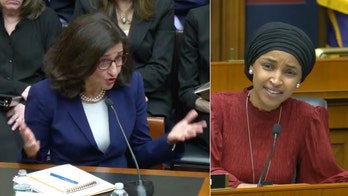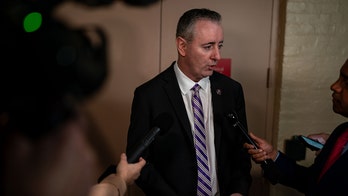White House investigation ransom attack on meatpacking company
A criminal organization likely based in Russia is believed to be behind a ransomware attack on JBS, one of the largest meat producers in the world; Lucas Tomlinson reports on the latest.
President Biden is expected to raise the issue of Russia-based ransomware attacks with President Vladimir Putin during their summit in Geneva later this month, the White House said Wednesday after critical infrastructure in the U.S. fell victim to another attack.
The latest ransomware assault this week shut down the U.S.-based meat plants of the world’s largest meatpacker, Brazil-based JBS. The White House said the hack was likely carried out by a criminal group based in Russia.
BIDEN, PUTIN TO MEET IN-PERSON JUNE 16 IN GENEVA, WHITE HOUSE CONFIRMS
"We do expect this to be one of the issues that the president will discuss with President Putin at the summit," White House press secretary Jen Psaki said Wednesday, adding that the Biden administration is "not taking any options off the table in terms of how we may respond" to the attacks.
"Of course, there’s an internal policy review process to consider that we’re in direct touch with the Russians, as well as to convey our concerns about these," Psaki said.
The White House, on Tuesday, said JBS "notified the administration that the ransom demand came from a criminal organization likely based in Russia."
"The White House is engaging directly with the Russian government on this matter and delivering the message that responsible states do not harbor ransomware criminals," White House principal deputy press secretary Karine Jean-Pierre told reporters Tuesday.
Psaki, on Wednesday, said the U.S. has seen an "increase" in ransomware attacks, adding that they have become "an increasing threat to the private sector and to our critical infrastructure, and there are other countries, many of whom we will see when the president is in Europe, who have similar concerns."
She added that the topic would be "an issue of discussion throughout the president’s trip."
Biden and Putin are set to meet in Geneva on June 16, and are expected to discuss a range of issues, including Iran and North Korea's nuclear capabilities, Syria, the Arctic, strategic stability, arms control, climate change, COVID-19 and more.
The meeting will take place next month while Biden is already in Europe, a source familiar with the arrangements explained to Fox News. The source said Biden will meet with Putin after meeting with G-7 allies, so he can understand their concerns and perspectives on Russia.
"I will say, in terms of what success looks like coming out of the summit, I can’t predict that at this point in time, but I can convey to you that this will certainly be a topic of discussion – that harboring criminal entities that are intending to do harm, that are doing harm to the critical infrastructure in the United States, is not acceptable," Psaki said. "We’re not going to stand by that, we will raise that, and we are not going to take options off the table in those conversations with the Russian government."
The attack on JBS comes just weeks after the largest U.S. fuel pipeline, the East Coast's Colonial pipeline, was targeted by a criminal group originating in Russia.
The Biden administration declined to condemn Putin after the Colonial pipeline attack and stressed that the U.S. did not believe Russia's government was involved. However, shifting tone, the White House on Wednesday said Putin and the government have "a role to play in stopping and preventing these attacks."
"There are criminal entities within a country, they certainly have a responsibility and it is a role that the government can play," Psaki said.
The U.S. and Russia have long competed on a global scale, and where the U.S. exceeds Russian capabilities, as in the case with the U.S. military, Putin has relied on other factors to bolster Russian dominance – including cyber-strikes.
US TELLS RUSSIA IT WON’T REJOIN OPEN SKIES ARMS CONTROL PACT
Meanwhile, Biden and Putin are also expected to again discuss the intent of the U.S. and Russia to pursue a "strategic stability dialogue on a range of arms control and emerging security issues" to build on the extension of the New START Treaty, according to the White House. The START Treaty places verifiable limits on all Russian deployed intercontinental-range nuclear weapons. The treaty began on Feb. 5, 2011, and according to the State Department, the U.S. and the Russian Federation have agreed to extend it through Feb. 4, 2026.
Biden has sought to pressure Russia though economic sanctions, imposing penalties last week on Russian companies and ships for their work on a natural gas pipeline in Europe, though the Biden administration spared the German company overseeing the project – leading to frustration from both Republican and Democratic lawmakers.
And last month, the Biden administration imposed a raft of new sanctions on Russia for its attempted interference in the 2020 election and a Kremlin-linked cyberattack that penetrated multiple federal agencies.
CLICK HERE TO GET THE FOX NEWS APP
The measures sanctioned 32 entities and individuals who sought to influence the outcome of the November election last year under orders from the Russian government. The White House also expelled 10 Russian diplomats working in Washington, including some intelligence officers.
In addition to those actions, the Biden administration barred U.S. financial institutions from buying Russian bonds directly from the Russian central bank, Finance Ministry and sovereign wealth fund, limiting Moscow’s ability to borrow money. Those limits will take effect June 14.
The Associated Press contributed to this report.







